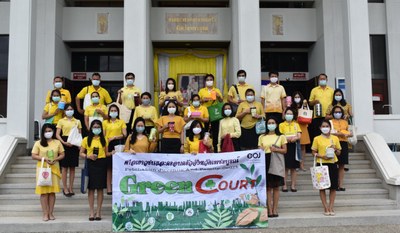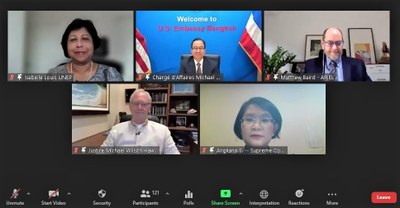USAID-Funded Asia Pacific Judicial Symposium Advances Planetary Environmental Justice with Thailand at the Vanguard
The symposium was co-organized by USAID Wildlife Asia, in partnership with the Office of the President of the Supreme Court (OPSC), the Supreme Court of Thailand (SCT), and the UN Environment Programme (UNEP), with assistance from Asian Research Institute for Environmental Law.
The participants discussed best practices on environmental adjudication and environmental courts in the larger judicial community in the region including models for establishing environment courts, environment court rules, and case management procedures and sentencing guidelines for environment and wildlife crimes.
According to Dr. Georgina Lloyd, Regional Coordinator of the UN Environment Programme (UNEP), the 2019 UNEP global assessment of environmental rule of law found that there has been a prolific growth in environmental laws and agencies worldwide over the last four decades, but “a failure to fully implement and enforce these laws is one of the greatest challenges to mitigating climate change, reducing pollution and preventing widespread species and habitat loss.”
“Whilst environmental laws have greatly increased, too often it is the implementation and enforcement of such laws and regulations that falls short from what is required to address our environmental challenges. So, the judges have a critical role. Courts can ensure that governments and other actors’ commitments are upheld, that laws are abided by and the environmental rule of law is maintained. In doing so, judges are enabling environmental and climate justice,” said Dr. Lloyd.
“Any matter which impacts upon the natural environment is going to be a matter of importance, but in the cases that I have decided, probably the most difficult case to decide has been cases concerning climate change. It is not only an existential threat to humanity and the planet, but also it raises very difficult legal questions,” said Justice Brian Preston, Land and Environment Court of New South Wales (Australia) in his presentation on Effective Environmental Courts and Adjudications.
One strong position that emerged among the participants is that during this time of a planet-wide environmental crisis, there is a need to adopt principles of planetary environmental justice.
“We need to give space to nature and ensure that its operating systems remain functional. We need to view ourselves as the judges of nature and the planet and move beyond environmental law and climate justice to planetary justice,” said Justice Syed Mansoor Ali Shah, Supreme court of Pakistan in his presentation on Environmental Jurisprudence in Pakistan.
Some of the speakers also pointed out the need to think over a much longer time horizon: “We have to think intergenerationally in a way that has never been done before. And that I would say does take a certain element of courage, because people our age may not necessarily want to make the sacrifices that are necessary under the law for younger people to be able to survive in the future,” said Justice Michael Wilson of the Hawai’i Supreme Court.
The Asia-Pacific Judicial Symposium on Environmental Court and Adjudication is the culmination of a two-year cooperative effort between USAID Wildlife Asia, the Supreme Court of Thailand, and other partners like UNEP to support the Thai Judiciary in advancing their own environment courts initiative. The cooperative effort includes raising awareness and providing targeted continuing legal education at several levels such as the development of the Introductory Course on International and National Environmental Law and Governance in Thailand, which provides the foundations of environmental law and environmental crimes, ensuring that wildlife crime is recognized as an integral part of environmental crime.
Thailand is currently drafting its own rules of procedure for environmental cases, which will now be informed by international best practices and other countries’ experiences following the Judicial Symposium. The event promoted Thailand’s regional judicial leadership in ASEAN and advanced Thailand’s own environment courts agenda. 
"The United States Government remains fully committed to its partnership with regional and national leadership across ASEAN to deter wildlife crime, conserve biodiversity, and uphold the rule of law for the regional stability that underpins a free and open Indo-Pacific. We are honored to work with the Royal Thai Government, and the Supreme Court of Thailand, to improve legal frameworks, to share among nations legal innovations and good practices, and to harmonize the penalties for wildlife crimes across all countries of the region," said Michael Heath, Chargé d'Affaires of the U.S. Embassy in Thailand.
The United States Government’s USAID Wildlife Asia Program is deterring wildlife crime and protecting endangered species from extinction by partnering with Southeast Asian countries to strengthen counter wildlife trafficking laws, arrest and prosecute criminals, and reduce demand for wildlife products through game-changing demand reduction campaigns.#


